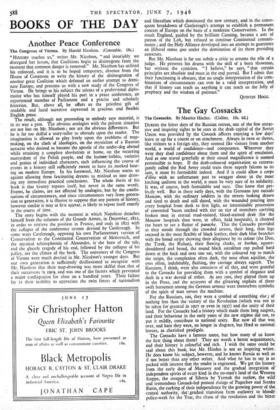BOOKS OF THE DAY
Another Peace Conference
The Congress of Vienna. By Harold Nicolson. (Constable. 18s.) "HisTom( teaches us," writes Mr. Nicolson, " and invariably we disregard her lesson, that Coalitions begin to disintegrate from the moment that common danger is removed." Mr. Nicolson has utilised his enforced, and it is to be hoped temporary, absence from the House of Commons to write the history of the disintegration of another great Coalition which defeated an earlier attempt to domi- nate Europe, and presents us with a new study of the Congress of Vienna. He brings to his subject the talents of a professional diplo- matist who has himself played his part in a peace conference, an experienced member of Parliament and a precise and scholarly historian. But, above all, he offers us the priceless gift of readable and lucid narrative expressed in gracious and flexible English prose. The result, although not pretending to embody new material, is in its way a gem. The obvious analogies with the present situation are not lost on Mr. Nicolson ; nor are the obvious differences. But he is far too skilful a story-teller to obtrude upon the reader. The imagination is allowed to play freely upon the problems of map- making, on the clash of ideologies, on the mysticism of a Russian autocrat who desired to become the apostle of the under-dog abroad while retaining a complete absolutism at home, on the recurring martyrdom of the Polish people, and the human• foibles, varieties and genius of individual characters, each influencing the course of events in a history still sufficiently recent to have its marked bear- ing on modern Europe. In his foreword, Mr. Nicolson warns us against allowing these fascinating dreams to mislead us into draw- ing any immediate practical conclusions. The whole thesis of his book is that history repeats itself, but never in the same words. Events, he claims, are not affected by analogies, but by the combi- nations of circumstances, and since circumstances vary from genera- tion to generation, it is illusive to suppose that any pattern of history, however similar it may at first appear, is likely to repeat itself exactly in the course of time.
The story begins with the moment at which Napoleon detaches himself from the columns of the Grande Armee, in December, 1812, in order to retrieve the position in France, and ends in 1822 with the collapse of the conference system devised by Castlereagh. In some ways Castlereagh, opposing his own Parliamentary version of Conservatism to the Continental Conservatism of Metternich, and the mystical schizophrenia of Alexander, is the hero of the tale, and the ghastly tragedy of his end, followed by the collapse of his policy, are the climax of the book. The conveners of the Congress of Vienna were much decried in Mr. Nicolson's younger days. But our own generation is sufficiently disillusioned to recognise with Mr. Nicolson that their map-drawing was more skilful than that of their successors ;n 1919, and was one of the factors which prevented a major conflagration for close on a hundred years. Their failure lay in their inability to appreciate the twin forces of nationalism and liberalism which dominated the new century, and in the conse- quent breakdown of Castlereagh's attempt to establish a permanent concert of Europe on the basis of a moderate Conservatism. In the result England, guided by the brilliant Canning, became a sort of patron of the Left, but refused to continue Continental commit- ments ; and the Holy Alliance developed into an attempt to guarantee an illiberal status quo under the domination of its three presiding autocrats.
But Mr. Nicolson is far too subtle a critic to assume the role of a judge. He presents his drama with the skill of a born showman, but without the cynicism. " I believe," he says, " that certain principles are absolute and must in the end prevail. But I admit that their functioning is obscure, that no single interpretation of the com- binations of circumstances can ever be a valid interpretation, and that if history can teach us anything it can teach us the folly of prophecy and the wisdom of patience."
QUINTIN HOGG.


























 Previous page
Previous page